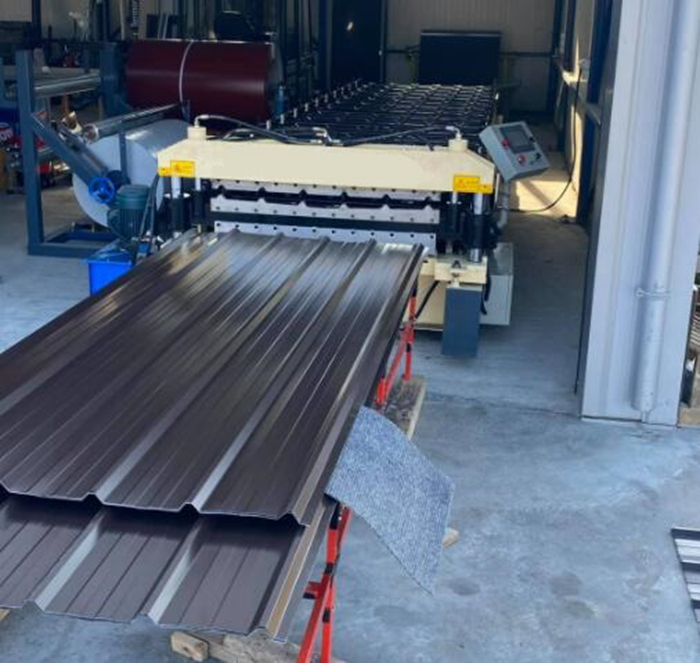Mobile Roll Forming Equipment for Efficient On-Site Production of Custom Metal Profiles
The Versatility and Efficiency of Mobile Roll Forming Machines
In the world of manufacturing, efficiency and adaptability are crucial. One of the most innovative developments in this field is the mobile roll forming machine. These machines are revolutionizing the way metal fabrication is approached, especially in industries that require on-site solutions. This article will delve into the features, benefits, and applications of mobile roll forming machines.
What is Mobile Roll Forming?
Mobile roll forming machines are portable versions of traditional roll formers. Unlike their stationary counterparts, these machines are designed to be transported easily to various job sites. They utilize a series of rollers to shape metal, typically continuously feeding sheets or coils through the system. The end result is a profile that can be used for roofing, siding, and other structural applications.
Key Features
1. Portability One of the standout features is their mobility. Mobile roll forming machines are built with transport in mind, often equipped with wheels or tracks that allow them to be moved from site to site effortlessly.
2. Compact Design With limited space often being a concern in construction sites, these machines are designed to be compact, allowing them to fit into smaller areas while still maintaining high production levels.
3. Customizable Profiles Many mobile roll forming machines can be configured to produce various profiles. This flexibility means that manufacturers can adapt the machinery to meet specific project needs without requiring extensive modifications.
4. Ease of Operation Operators can generally run these machines with minimal training. Modern mobile roll forming machines often feature user-friendly controls and automated functions that streamline operations and reduce labor costs.
Benefits of Mobile Roll Forming Machines
1. Cost-Effective By producing materials on-site, mobile roll forming machines significantly reduce transportation costs and logistics challenges. This immediacy allows for quicker project turnaround times.
mobile roll forming machine

2. Waste Reduction Using mobile roll forming machines minimizes material waste. Since materials can be cut precisely to size on-site, there is less excess left over compared to traditional methods where materials may need to be delivered in bulk.
3. Improved Quality Control Producing profiles on-site means that manufacturers can maintain higher standards of quality control. Any necessary adjustments can be made quickly, ensuring that the finished product meets specifications without delays.
4. Time-Saving The speed of mobile roll forming machines allows for rapid production, increasing the overall efficiency of projects. This advantage is particularly valuable in the construction industry, where timelines are often tight.
Applications
Mobile roll forming machines find applications in various industries. Some of the most common include
1. Construction The construction industry heavily relies on these machines for producing roofing sheets, wall panels, and structural components. Mobile units can quickly produce the required materials on-site, thereby reducing delivery times.
2. Agriculture Farmers and agricultural businesses utilize mobile roll forming for creating grain bins, storage sheds, and fencing materials. The ability to fabricate components on-site caters to the specific needs of agricultural operations.
3. Manufacturing Manufacturers appreciate the flexibility of mobile roll forming machines to produce parts that fit into the broader assembly of their products. Custom profiles can be created on-demand without waiting for external suppliers.
4. Architecture and Design Architects and designers who work on unique projects can benefit from the customization options offered by these machines. They can produce bespoke profiles that fulfill their creative vision without sacrificing efficiency.
Conclusion
The advent of mobile roll forming machines marks a significant advancement in metal fabrication technology. Their portability, efficiency, and adaptability make them invaluable tools across various industries. By enabling on-site production, these machines not only save costs but also enhance quality control and reduce waste. As industries continue to seek innovative solutions to meet their manufacturing needs, mobile roll forming machines are poised to play an increasingly significant role in shaping the future of production. With their versatility and efficiency, they are indeed an impressive leap forward in the world of manufacturing technology.
-
Roof Panel Machines: Buying Guide, Types, and PricingNewsJul.04, 2025
-
Purlin Machines: Types, Features, and Pricing GuideNewsJul.04, 2025
-
Metal Embossing Machines: Types, Applications, and Buying GuideNewsJul.04, 2025
-
Gutter Machines: Features, Types, and Cost BreakdownNewsJul.04, 2025
-
Cut to Length Line: Overview, Equipment, and Buying GuideNewsJul.04, 2025
-
Auto Stacker: Features, Applications, and Cost BreakdownNewsJul.04, 2025
-
Top Drywall Profile Machine Models for SaleNewsJun.05, 2025








